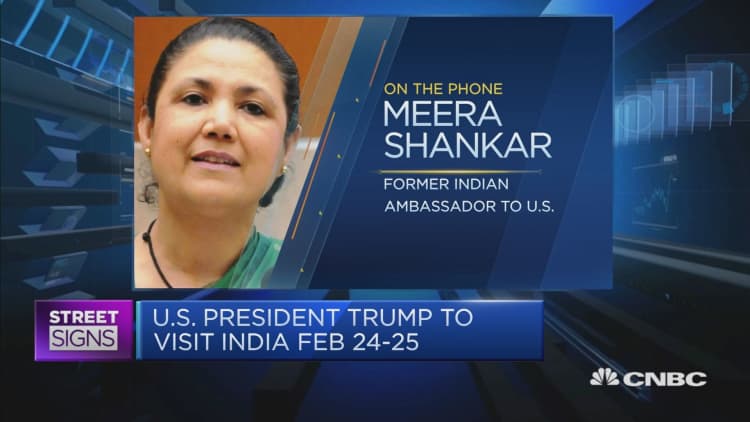
President Donald Trump's "America First" policy and Prime Minister Narendra Modi's "Make in India" campaign will make a trade deal between the two countries more difficult, the former Indian ambassador to the U.S. said Friday.
Still, a trade agreement when Trump visits Modi in India next week is not insurmountable, Meera Shankar told CNBC's "Street Signs."
"I think given patience and time, both countries have the desire to resolve their differences in a way which is mutually beneficial," Shankar said. "There are a number of small issues on the table, which could be perhaps handled more easily and then there are more complex issues, which will take time to resolve, like data localization." She was referring to rules currently under consideration that would require internet companies to store information on Indian users within the country.
Trump is due to start his two-day state visit to India on Monday, with official engagements in New Delhi and Ahmedabad in Modi's home state of Gujarat. It will be Trump's first official visit to India since taking office in January 2017.
Washington and New Delhi's trade dispute heightened last year when the U.S. removed India from a long-running program that allowed the South Asian country to export many of its goods into the United States without tariffs. In response, India levied retaliatory tariffs on 28 U.S. products.
Still, experts suggest that a trade deal could be reached next week, with defense, energy, medical devices, and agriculture among items said to be on the table.
New law may complicate things
Experts have also raised concerns that India's plans to introduce a comprehensive data privacy law may complicate matters. The Personal Data Protection Bill could have potential ramifications for U.S. tech companies such as Facebook and Google.
The bill is currently under review in parliament and would prohibit companies from processing sensitive personal information outside India. While sensitive personal information may be transferred outside the country under special circumstances, they must still continue to be stored inside India, according to an analysis from PwC.
If companies want to use someone's personal information, they need to seek explicit permission and that user may request for their data to be erased. It is similar to the provisions in Europe's General Data Protection Regulation.
Asked if the bill could complicate the relationship between India and the U.S., Shankar said it's a larger issue than just the two countries.
"There are questions of security of data, there are questions of privacy of citizens, there are a large number of questions and these have to be balanced versus (the) ease of operation," she said.
"There will be a larger negotiation on this issue at a global level."


